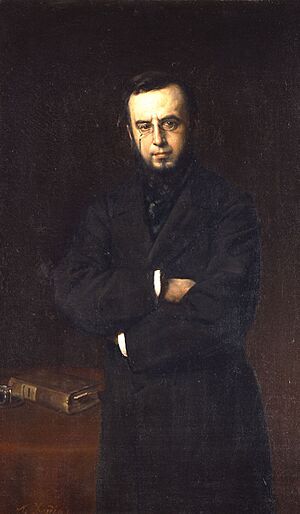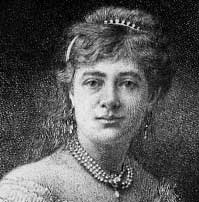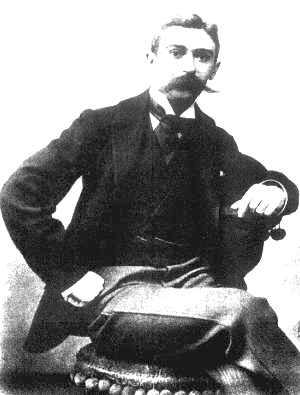Demetrios Vikelas facts for kids
Quick facts for kids
Demetrios Vikelas
|
|
|---|---|
| Δημήτριος Βικέλας | |
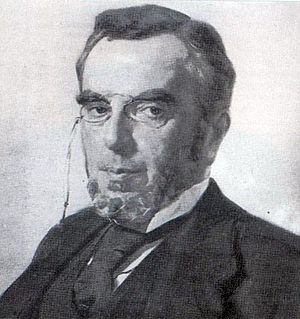 |
|
| 1st President of the International Olympic Committee | |
| In office 1894–1896 |
|
| Preceded by | Office established |
| Succeeded by | Pierre de Coubertin |
| Personal details | |
| Born | 15 February 1835 Ermoupoli, Greece |
| Died | 20 July 1908 (aged 73) Athens, Greece |
Demetrios Vikelas (also known as Demetrius Bikelas; Greek: Δημήτριος Βικέλας; born February 15, 1835 – died July 20, 1908) was a Greek businessman and writer. He was the very first President of the International Olympic Committee (IOC) from 1894 to 1896.
Demetrios Vikelas spent his early years in Greece and Constantinople (which is now Istanbul). He later became successful in business in London, where he also got married. After that, he moved to Paris with his wife. He decided to leave the business world and focus on writing about literature and history. He wrote many novels, short stories, and essays, which made him quite famous.
Because of his good reputation and the fact that he lived in Paris, he was chosen to represent Greece at an important meeting. This meeting was organized by Pierre de Coubertin in June 1894. At this meeting, they decided to bring back the Olympic Games and hold them in Athens in 1896. Vikelas was chosen to lead the committee that would organize these first modern Olympic Games. After the Games were finished, he stepped down from his role and stayed in Athens until he passed away in 1908.
Contents
Early Life
Vikelas was born in Ermoupoli, a town on the island of Syros in Greece. His father was a merchant from Veria (which was then part of the Ottoman Empire). His mother, Smaragda, came from the wealthy Melas family. Demetrios was taught at home by his mother, possibly because he was not very strong or healthy as a child.
When he was six years old, his family moved to Constantinople. Ten years later, they moved again to Odessa. There, Demetrios started working in his father's business.
Even at a young age, he showed a talent for writing. When he was 17, he translated Esther, a famous play by Jean Racine, from French into Greek.
Life in London: From Business to Writing
In 1852, at age 17, Demetrios left home to live in London with his uncles, Leon and Vasileios Melas. He worked for their business, Melas Bros, first as a bookkeeper and later as a partner. He also wrote weekly letters to his mother, which are now very helpful for understanding his life story. He also kept a journal where he wrote about his daily life, advice from his uncle, and his thoughts on books and plays.
After working at his uncles' business during the day, he took evening classes at University College London. This was the only university in London at the time that did not require students to be Anglican (a type of Christian). He earned a degree in botany (the study of plants), which was the only subject offered in evening classes. He also learned German and Italian. He tried fencing, horse-riding, and rowing, but couldn't continue them. He became very studious and started publishing his own works. In 1862, he published a collection of poems. He also wrote many articles for London magazines about the British press and growing cotton in Greece.
During the political changes in Greece in 1863, when King Otto was removed and George I became king, Vikelas helped raise money to support the new government. He also wrote letters to major newspapers, asking them to respect Greece's rights. He became well-known in Britain in 1866 when he contacted writers and professors to get their support for the people of Crete. This was during the Cretan Revolt of 1866-1867, and he also helped raise more money for them.
Also in 1866, he married Kalliope Geralopoulou. She was the younger sister of his uncle's wife and also came from a wealthy merchant family in London. He also became a full partner in his uncles' business.
He met and became friends with Charilaos Trikoupis, who was the son of the Greek ambassador to Britain. Charilaos later became the Prime Minister of Greece. The two men wrote many letters to each other.
Demetrios Vikelas continued to gain favor in Greece. In 1868, he published an article with facts and figures about the Kingdom of Greece after a talk at the Royal Statistical Society. In 1870, he started a school for Greek children living in England. All his work, whether it was about politics, history, or literature, had two main goals: to improve the spirit and intelligence of his country, and to improve Greece's image in the rest of the world. In his 1874 historical essay, On the Byzantines, he wrote that he wanted to improve the reputation of the Byzantine Empire.
In 1876, because of an economic downturn that started in 1873, Vikelas and his uncles closed their business (which was then called "Melas Bros - D. Vikelas"). This left him with a good amount of money, which allowed him to focus completely on his writing.
Paris: Family and Literature
In 1874, after her father passed away, Vikelas's wife, Kalliope, began to experience some health challenges. The couple tried traveling to help her feel better. In Paris, after another difficult period, doctors said Kalliope needed special care, and she stayed for about seven and a half months in a special facility in Ivry-sur-Seine. Vikelas, true to his careful nature, wrote down notes about his wife's health every day for the next twenty years.
In his journal, Vikelas had expressed a wish to move to Athens since 1872. In 1877, when Kalliope's condition improved, they took the chance to move. Vikelas started building a home near Panepistimiou Street (where the University of Athens is) and Voukourestiou Street. However, his wife's health worsened again, and he went with her back to France, where she again stayed in Ivry-sur-Seine.
During his time in Paris, Vikelas began translating plays by William Shakespeare into Greek. He translated King Lear, Romeo and Juliet, and Othello during his wife's first stay in 1878. Later, in 1881, he translated Macbeth and Hamlet. Public readings of his translations were very popular in Athens' literary community. He also wrote his most important literary work, Loukis Laras. This book first appeared in Athens as a series starting in 1879. The same year, it was translated into French and German. The French translation was so well-liked that the Education Minister, Jules Ferry, included it on a list of books that could be given as prizes to good students.
Vikelas spent the next fifteen years in Paris, making connections with writers and thinkers in the French capital. For example, Juliette Adam dedicated her book Poètes grecs contemporains ("Contemporary Greek poets"), published in 1881, to him. He also wrote for her magazine, Nouvelle Revue. He wrote many articles for it, covering topics like Byzantine history, Eastern issues, and Greek politics. He also published novels (a collection in French and Greek came out in 1887) and even travel guides.
In Greece, there was a debate about which form of the Greek language to use: Katharevousa (a more formal, older version) or Dimotiki (a more common, everyday version). Vikelas chose a middle path. He didn't like the extreme ideas of those who only wanted Dimotiki, nor the strong defenders of the very formal language. He suggested using Katharevousa for official things like parliamentary meetings, but using the more common language for poetry.
Between 1877 and 1892, he traveled a lot because, during her most difficult times, his wife found his presence hard to bear. He returned to Greece, and also visited Scotland, Switzerland, Spain, and Constantinople.
In 1892, he bought a new piece of land in Athens and built a new house there, which became his final home.
In 1893, he helped pay for the building of the Greek Orthodox church in Paris.
In May 1894, he received a request from the Pan-Hellenic Gymnastic Club. They asked him to attend a meeting about amateur sports that Pierre de Coubertin was holding the next month. After some thought, he agreed to represent the club. After the meeting, it was decided to bring back the Olympic Games and hold them in Athens.
Originally, Pierre de Coubertin wanted to hold the first modern Olympics in Paris in 1900. But Vikelas convinced him and the newly formed International Olympic Committee that the Games should be held in Athens. This would create a symbolic link to the original Games. At that time, the rules of the IOC said that the president had to be from the country hosting the next Games. Because of this, Demetrios Vikelas became the IOC's first president.
Return to Greece
With his new role in organizing the 1896 Summer Olympics, Vikelas returned to Greece for a short visit in the autumn of 1894. On October 14, he received a telegram saying that his wife's health had worsened significantly. He quickly returned to Paris. It seems she passed away around that time.
In November 1894, a group of young Greek officers, who supported the idea of a greater Greece (the Megali Idea), formed a secret society called Ethniki Etairia. Their goal was to boost the country's spirit and prepare to free Greek people still living under the Ottoman Empire. In September 1895, they invited civilians to join, including Vikelas, who was involved in organizing the Olympic Games. Vikelas later said he only joined because of friendly pressure, that his role was only financial, and that he quickly resigned. At this point, he was still very hopeful about helping his country grow stronger.
After the 1896 Olympic Games, which were a great success, Vikelas stepped down from the IOC. He was replaced as a member by Count Alexander Mercati and as president by Coubertin. The defeat in the Greco-Turkish War that happened soon after greatly saddened him. He decided to leave Paris and move back to Athens permanently. There, he focused on helping to educate the public. In 1899, he started the "Society for the Spread of Useful Books" in Athens, hoping to help the country recover from its defeat.
In 1905, he represented the University of Athens at the third Olympic Congress and seventh IOC Meeting in Brussels. He also remained an active member of the Hellenic Olympic Committee. He passed away in Athens on July 20, 1908, after an illness.
He was honored as a knight of the Legion of Honour in France on December 31, 1891. He also received an honorary doctor title from the University of St Andrews in Scotland in November 1893, being the first Greek to receive this honor. He was a member (from 1874, and Vice-President from 1894) of the French "Association for the Promotion of Greek Studies," and of the Society for the Promotion of Hellenic Studies in London.
Legacy
Demetrios Vikelas gave his huge collection of books to the city of Heraklion in Crete. This gift helped create the Vikelaia Municipal Library.
Even though he didn't live most of his life on Syros island, the island considers him one of its most famous people. Today, the Sports Center (Stadium) in Ermoupoli is named after Demetrios Vikelas. This stadium can hold 2000 people and has an Olympic-size swimming pool, four tennis courts, two gym halls, basket and volleyball courts, track and field, a floor football court, and a soccer field.
The Syros Island National Airport is also named after him.
The Olympic Movement
First Olympic Congress
Pierre de Coubertin had already tried to restart the Olympic Games at a meeting in 1892. While he made the public excited, he didn't get a firm commitment to bring the Games back.
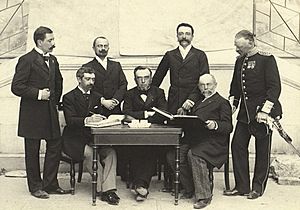
He decided to try again at the 1894 Congress. This meeting was officially about amateur sports, but it also secretly aimed to bring back the Olympic Games. Six of the seven topics discussed were about amateurism (like what it means, and rules about betting). The seventh topic was about bringing back the Games. Coubertin also wanted his meeting to be international. He got support from important people like the King of the Belgians, the Prince of Wales, the Crown Prince Constantine of Greece, and William Penny Brookes. Brookes was the founder of the "Olympian Games" in England. Another supporter was Ioannis Phokianos. Phokianos was a math and physics professor and a school principal. He also promoted sports in Greece and organized Olympic Games sponsored by Evangelis Zappas in 1875. In 1888, Phokianos organized a special private Games as the founder of the Pan-Hellenic Gymnastic Club. Phokianos couldn't travel to Paris for the Congress because of money and because he was finishing his new college building. So, he asked Demetrios Vikelas, who was a respected Greek person living in Paris, to attend the Congress for him.
Writings and Historical Works
Novels and Short Stories
- Poems, London, 1862.
- Loukis Laras; his most important work. It's a historical, patriotic, and moral novel. The story is told in a simple, natural way, making it easy for many people to read. The action takes place during the Greek War of Independence in places like Smyrna, Chios, Syros, and the Cyclades. An old, rich Greek merchant in London thinks back on his adventures when he was young. The novel was first published as a series starting in 1879 in the Athenian magazine Estia. This book was translated into eleven different languages.
- Nouvelle grecques (Greek Novels), translated into French, 1887.
- "Philippe Marthas (Nouvelle grecque)" appeared in La Nouvelle Revue., September–October 1886.
- Papa-Narcissus, novel, 1887.
- Filippos Marthas, novel, 1887.
- Tales of the Aegean, 1894.
Books and Historical Articles
- Articles about Palaiologos, the last ruling family of the Byzantine Empire, in the Athenian journal Pandora, 1859-1860.
- On the Byzantines., London, 1874.
- "Les Grecs aux conciles de Bâle et de Florence." (The Greeks at the Councils of Basel and Florence), La Nouvelle Revue., May–June 1882.
- "La Grèce avant la révolution de 1821" (Greece before the 1821 revolution), La Nouvelle Revue., January–February 1884.
- De Nicopolis à Olympie. Lettres à un ami. (From Nicopolis to Olympia. Letters to a friend.), 1885. (This was based on his letters with the Marquis de Queux de Saint-Hilaire).
- "The Byzantine Empire", Scottish Review, October 1886.
- "Byzantism and Hellenism", Scottish Review, January 1887.
- "The Subjects of the Byzantine Empire", Scottish Review, April 1887.
- "Greece before 1821", Scottish Review, April 1889.
- "The Formation of the Modern Greek State", Scottish Review, July 1889.
- "L'Empereur Nicéphore Phocas" (Emperor Nikephoros Phokas), La Nouvelle Revue., July–August 1890.
- Seven Essays on Christian Greece., 1890.
- "Le Philhellénisme en France." (Love for Greece in France), Revue d'Histoire diplomatique., 1891.
- "La Littérature byzantine" (Byzantine Literature), Revue des deux mondes, March–April, 1892.
- Grèce Byzantine et moderne. (Byzantine and Modern Greece), Firmin Didot, Paris, 1893.
Political and Other Works
- "Journalism in England", Eunomia (Athens), 1864.
- "Statistics of the Kingdom of Greece", Journal of the Royal Statistical Society, September 1868.
- Le Rôle et les aspirations de la Grèce dans la question d'Orient. (The Role and Aspirations of Greece in the Eastern Question), Cercle Saint-Simon, Paris, 1885.
- "Vingt-cinq années de règne constitutionnel en Grèce" (Twenty-five years of constitutional rule in Greece), La Nouvelle Revue., March–April 1889.
- "The Territory of the Hellenic Kingdom", October 1889.
Translations
He translated stories by Hans Christian Andersen (for his nieces and nephews) and several plays by William Shakespeare into Greek.
See also
 In Spanish: Dimitrios Vikelas para niños
In Spanish: Dimitrios Vikelas para niños
 | Stephanie Wilson |
 | Charles Bolden |
 | Ronald McNair |
 | Frederick D. Gregory |


